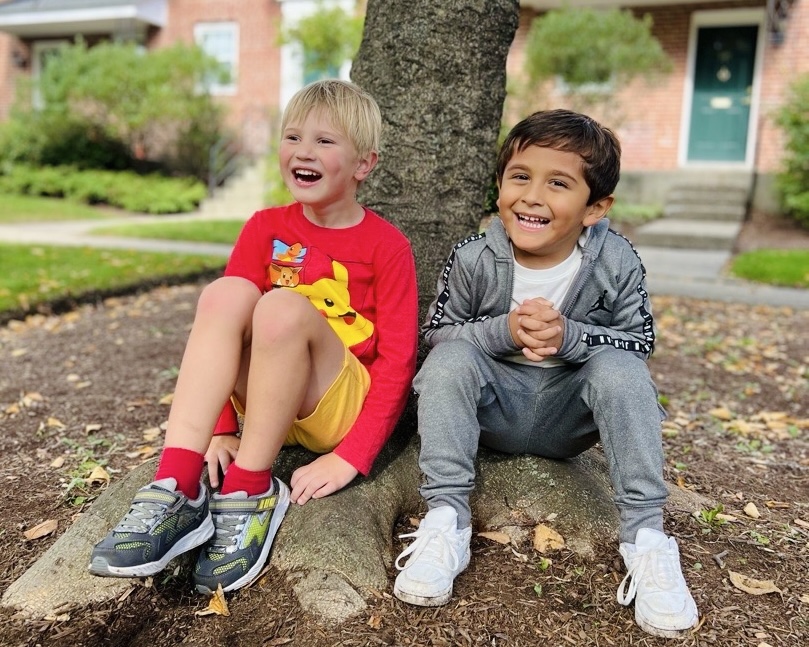“Social-emotional learning occurs throughout human development. We can learn and improve our social and emotional competence at every age from infancy through adulthood.”
What You’ll Learn
- What is social-emotional learning?
- What is the developmental process of social-emotional learning?
- What social-emotional skills can I expect my child to demonstrate?
Amy (2 years old) wanted to build a castle. She found some blocks and began working, putting one block on top of the other. Soon, her castle was as tall as her. Then, Amy decided to add one more block to the top of her castle, but before she could even step back to admire her work, it all came tumbling down. You might imagine that what I tell you next is how Amy began to cry and became increasingly dysregulated. While this is a very reasonable guess based on Amy’s age and the situation at hand, it is not how this story ends.
Amy and her classmates had recently learned some skills to regulate during moments of frustration. As her castle fell apart, Amy did not cry. Instead, Amy took one deep breath and said to herself, “Try again!”. Here, I introduce you to the magic of social-emotional learning (SEL).
Social-Emotional Learning: A Brief Overview
Social-emotional learning (SEL) is the foundation to become a thriving individual. SEL is the process through which we acquire the knowledge and skills toward self-awareness, self-management, social awareness, relationship skills, and responsible decision-making (CASEL, 2023). You can learn more about the effectiveness of SEL and why it is important for all children in the following SolBe blog post—An Introduction to Social-Emotional Learning.
Social-Emotional Learning is Developmental
SEL occurs throughout human development and is influenced by multiple contexts—communities, families and caregivers, schools, and classrooms. This means that we can learn and improve our social and emotional competence at every age from infancy through adulthood. SEL, however, varies across development and should be informed by the individuals’ social, emotional, and cognitive developmental levels.
Let’s consider the story I shared about Amy. Amy is 2 years old and is often expected to cry or have a tantrum when frustrated—this is developmentally appropriate. Even at 2 years old, however, Amy can begin learning skills that will help her develop increased self-awareness and self-management. Now, I wouldn’t expect all 2-year-olds to be able to take a deep breath and use positive self-talk independently, but these are appropriate skills to teach at this stage of development!
Social-Emotional Skills: Infants to Preschoolers
Knowing when your child will gain these social and emotional skills is important and can help you determine how to support their social-emotional development. Here is a list of social and emotional milestones at different ages. Please remember, however, that all children develop at their own pace—these are simply milestones you might expect your child to meet at these ages:
Infant & Toddler
By 2–3 months
- Smiles in response to caregiver’s vocalizations or smiles
- Responds to gentle touch and occasionally self-soothes
- Expresses emotions using distinct facial expressions
- Cries to get needs met
By 4–5 months
- Participates in turn-taking conversation (vocalization)
- Expresses emotions using facial expressions or vocalization
- Recognizes their primary caregiver by sight and becomes aware of strangers
- Seeks a caregiver for comfort, help, and play
By 8–9 months
- Develops joint attention skills—looks in the same direction as the caregiver and follows their gaze
- Responds to other people’s emotions by crying, smiling, or laughing
- Recognizes themselves in a mirror
By 12–18 months
- Are more interactive—handing over a toy or making a noise to get their caregiver’s attention
- Enjoys simple interactive games, like Peekaboo
- Uses gestures to say bye and communicate interests and needs
- Reacts by looking upset when they see someone else cry
- Imitates and explores their environment more independently
Toddler & Preschool
18 months–2 years
- Faces challenges persistently and enthusiastically
- Develops confidence and autonomy—has more temper tantrums as they begin to communicate and become independent
- Plays parallel to another child and imitates adults and other children
- Manipulates their subjective emotions into a more socially-accepted way
3–4 years
- Starts to show and verbalize a wider range of emotions
- Shows interest in pretend play and starts playing with other children—learns cooperation and sharing skills
- Spontaneously expresses caring and kindness
- May still have tantrums because of changes in routine or other events
Empowering Takeaways
- Social-emotional learning is developmental. Your child will develop these skills over time with the right support.
- It is never too early to start modeling and practicing social-emotional learning.
- All children develop and reach milestones at their own pace.
Be vibrant and keep thriving!
This article was last reviewed or updated on December 1, 2023.
References
Collaborative for Academic, Social, and Emotional Learning. (2023). Transformative SEL. https://casel.org/fundamentals-of-sel/how-does-sel-support-educational-equity-and-excellence/transformative-sel/
Collaborative for Academic, Social, and Emotional Learning. (2023). What is the CASEL framework? https://casel.org/fundamentals-of-sel/what-is-the-casel-framework/#social-emotional-learning
Denham, S. A. (2018). Keeping SEL developmental: The importance of a developmental lens for fostering and assessing SEL competencies. Frameworks Briefs. https://acrobat.adobe.com/id/urn:aaid:sc:VA6C2:50c18a02-45d9-46bd-bf3d-64e7f7c0d2a6
Duffell, J. C., Weissberg, R. P., Williams, A., Eaton, P. D., Segneri, M., Carstarphen, M. J., Matheny, R. K., Amador, A., Koch, R., & Kranzler, D. (n.d.). How social-emotional learning helps children succeed in school, the workplace, and life. Committee for Children. https://www.cfchildren.org/wp-content/uploads/mission-vision/what-is-sel/docs/sel-e-book.pdf
Malik, F., & Marwaha, R. (2022). Developmental Stages of Social Emotional Development in Children. StatPearls Publishing. https://www.ncbi.nlm.nih.gov/books/NBK534819/



